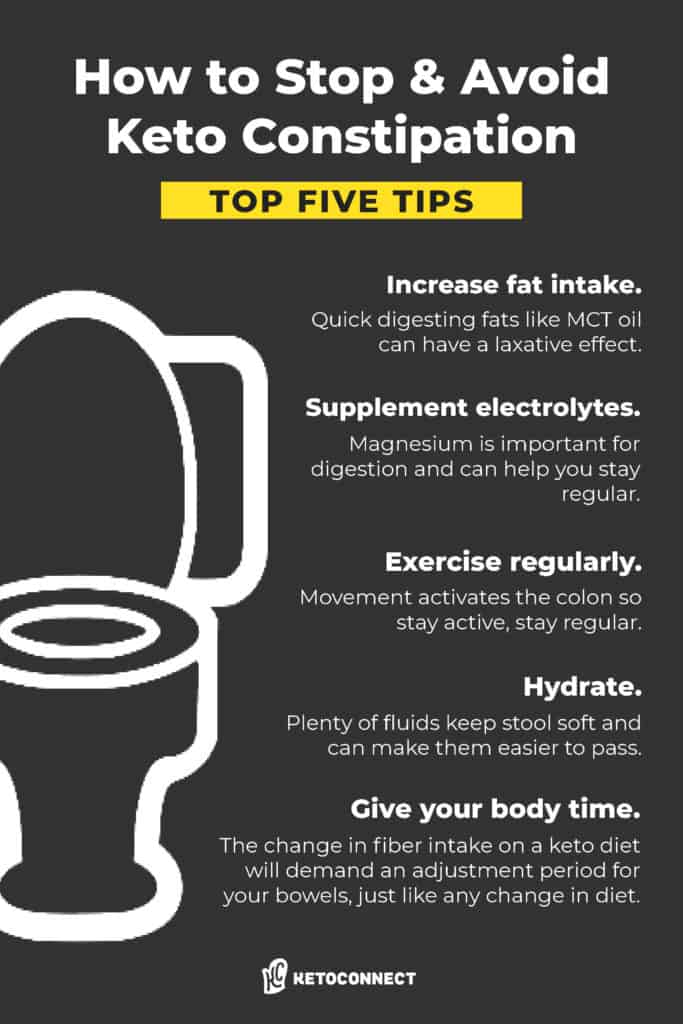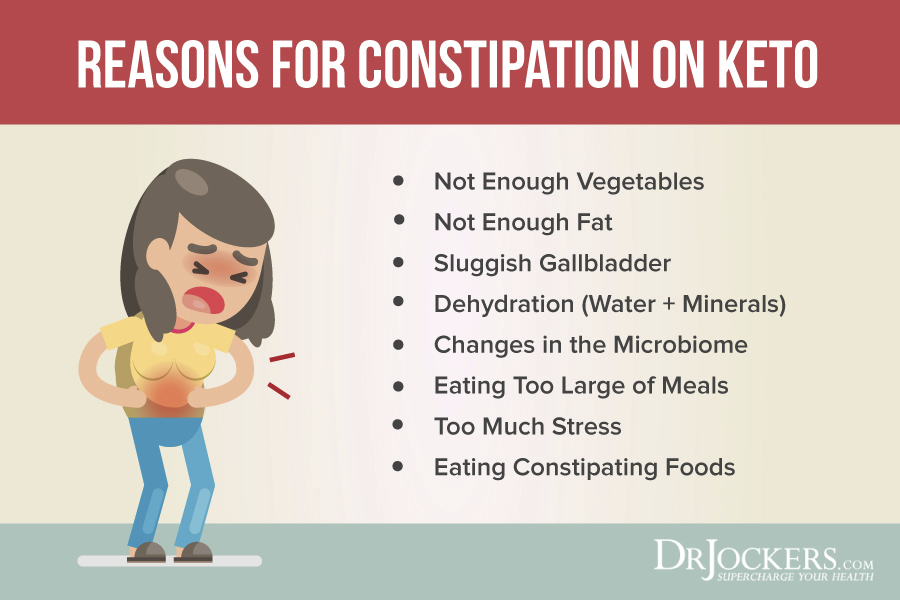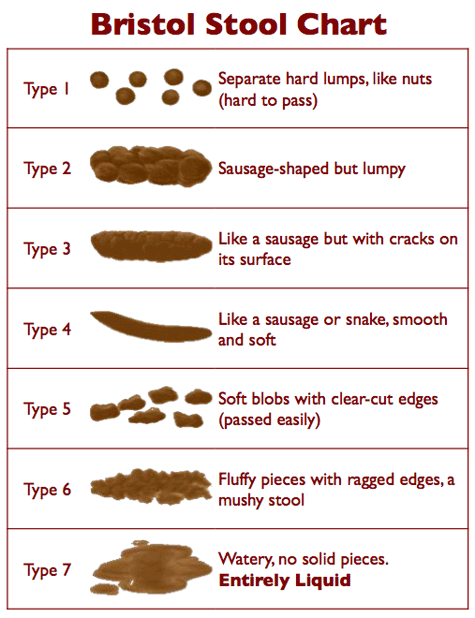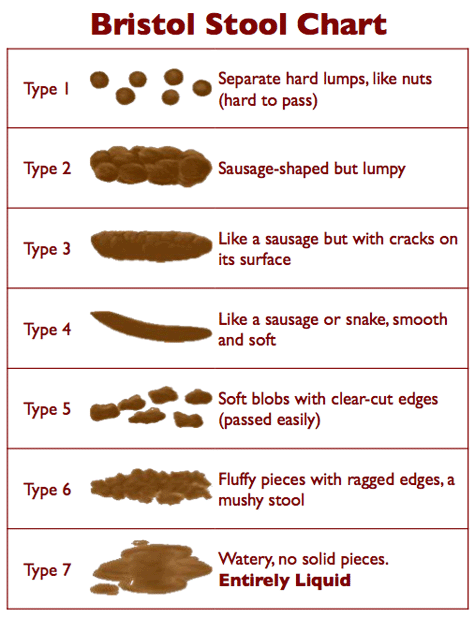Have you ever tried out the keto diet? It’s become quite popular recently for its weight loss and health benefits. But here’s a question for you: have you ever experienced constipation while on the keto diet? If so, don’t worry, you’re not alone! In this article, we’ll explore the connection between the keto diet and constipation, and how you can potentially alleviate this uncomfortable side effect.
So, let’s dive into the details. The keto diet is a low-carb, high-fat diet that forces your body to enter a state of ketosis, where it burns fat for fuel instead of carbohydrates. While this can lead to significant weight loss and several health benefits, such as reducing inflammation and improving insulin sensitivity, it can also have some unintended consequences, like constipation. The main culprit behind this is the lack of fiber in the keto diet. Without sufficient fiber, your digestive system may slow down, making it harder to pass stool. However, the good news is that there are ways to combat this issue and make your keto journey a more comfortable one. In our upcoming article, we’ll provide you with practical tips to help alleviate constipation on the keto diet, so stay tuned!

Understanding the Keto Diet
What is the keto diet?
The keto diet, or ketogenic diet, is a low-carb, high-fat diet that has gained popularity in recent years. It involves reducing carbohydrate intake and increasing fat intake to encourage the body to enter a state of ketosis. In ketosis, the body primarily burns fat for energy instead of carbohydrates.
How does the keto diet work?
When you consume a high amount of carbohydrates, your body converts them into glucose, which is used as the primary source of energy. However, on the keto diet, you restrict your carbohydrate intake to less than 50 grams per day. This depletion of carbohydrates forces your body to look for an alternative fuel source.
In the absence of glucose, your body begins to break down fat into ketones, which are molecules that can be used as energy. This metabolic process is known as ketosis. By following the keto diet, you are essentially training your body to become more efficient at burning fat.
Benefits of the keto diet for weight loss
One of the main reasons why people choose to follow the keto diet is its potential for weight loss. When your body is in ketosis, it becomes more efficient at burning stored fat for fuel. This can lead to significant weight loss over time.
In addition to weight loss, the keto diet has been shown to have other health benefits. It can help improve insulin sensitivity, regulate blood sugar levels, and reduce inflammation in the body. Some studies have also suggested that the keto diet may have a positive impact on conditions such as epilepsy, Alzheimer’s disease, and certain types of cancer.
Exploring Constipation
What is constipation?
Constipation is a common digestive issue that affects many people. It is characterized by infrequent bowel movements or difficulty passing stool. When you are constipated, your stool becomes hard, dry, and difficult to pass.
Common causes of constipation
Several factors can contribute to the development of constipation. Some of the most common causes include:
- Low fiber intake: A diet low in fiber can lead to constipation as fiber helps add bulk to the stool and promotes regular bowel movements.
- Inadequate hydration: Not drinking enough water can cause the stool to become dry and hard, making it difficult to pass.
- Lack of physical activity: Leading a sedentary lifestyle can slow down digestive processes and contribute to constipation.
- Medications: Certain medications, such as painkillers, antidepressants, and antacids, can cause constipation as a side effect.
- Changes in routine or travel: Disruptions to your regular routine or traveling can disrupt your body’s natural bowel habits and lead to constipation.
Symptoms of constipation
The symptoms of constipation can vary from person to person. Some common signs include:
- Infrequent bowel movements (less than three times per week)
- Difficulty passing stool or straining during bowel movements
- Hard, dry, or lumpy stool
- Abdominal discomfort or bloating
- Feeling of incomplete bowel movement
Linking Keto Diet and Constipation
The relationship between the keto diet and constipation
It is not uncommon for individuals on the keto diet to experience constipation. This is because the diet is typically low in dietary fiber, which is essential for maintaining regular bowel movements. Without enough fiber, the stool can become dry and difficult to pass, leading to constipation.
Why does the keto diet cause constipation?
The reduction in carbohydrate intake on the keto diet often means that you are also reducing your intake of fiber-rich foods, such as whole grains, fruits, and legumes. These foods are important sources of dietary fiber, which adds bulk to the stool and helps promote regular bowel movements.
Additionally, the high fat content of the keto diet can slow down the digestive process. This can further contribute to constipation, as the slower movement of food through the digestive tract can lead to a buildup of stool in the colon.
Impact of reduced fiber intake on bowel movements
Fiber plays a crucial role in maintaining healthy bowel movements. It adds bulk to the stool, softens it, and helps it move through the digestive tract more easily. When you reduce your intake of fiber on the keto diet, it becomes more difficult for the stool to pass through the intestines.
Without enough fiber, the stool can become dry and compacted, leading to constipation. Increasing your fiber intake can help alleviate this issue and promote regular bowel movements.
Understanding Ketosis
What is ketosis?
Ketosis is a metabolic state in which the body primarily burns fat for fuel instead of carbohydrates. When you are in ketosis, your liver converts fat into ketones, which are then used as energy by your cells. This process occurs when the body’s insulin levels are low, typically brought about by limiting carbohydrate intake.
How does the body enter ketosis on a keto diet?
To enter ketosis, you need to restrict your carbohydrate intake to a very low level, typically less than 50 grams per day. By doing so, you deplete your body’s glycogen stores, which are the stored form of glucose in the liver and muscles.
Once the glycogen stores are depleted, your body begins to break down fat into ketones for energy. This shift from using glucose to ketones as the primary fuel source is what characterizes ketosis.
Effects of ketosis on the digestive system
While the keto diet can have numerous benefits, it may also lead to changes in the digestive system. In some individuals, the transition to ketosis can cause temporary digestive discomfort, such as bloating, diarrhea, or constipation.
These digestive issues are typically temporary and subside as the body adjusts to the changes brought about by the keto diet. However, if constipation persists or becomes severe, it is important to seek medical advice.
Potential Side Effects of the Keto Diet
Common side effects of the keto diet
Along with constipation, there are several other side effects that individuals may experience when starting the keto diet. These can include:
- Keto flu: Some people may experience flu-like symptoms, such as headaches, fatigue, and irritability, when initially transitioning to the keto diet. These symptoms are often temporary and improve as the body adapts to ketosis.
- Increased thirst and frequent urination: As your body enters ketosis, it releases stored water, which can lead to increased thirst and more frequent urination.
- Bad breath: A common side effect of ketosis is the production of ketones, which can give your breath a fruity or metallic odor.
- Insomnia or changes in sleep patterns: Some individuals may experience difficulty falling asleep or changes in their sleep patterns when following the keto diet.
How do side effects like constipation occur?
The side effects of the keto diet, including constipation, often occur as a result of the body’s adjustment to the change in macronutrient ratios. When transitioning from a diet that is high in carbohydrates to one that is high in fats, it can take time for the body to adapt to this new way of eating.
The reduction in fiber intake, combined with the slower movement of food through the digestive system due to the high fat content, can contribute to constipation. Additionally, changes in gut bacteria composition may also play a role in digestive issues experienced on the keto diet.
Maintaining a healthy balance while on keto
To minimize the side effects of the keto diet, including constipation, it is important to maintain a healthy balance of macronutrients and prioritize your overall dietary needs. Here are a few tips to consider:
- Increase fiber intake from keto-friendly sources: While the keto diet is typically low in carbohydrates, there are still plenty of keto-friendly foods that are high in fiber. Some examples include leafy green vegetables, avocados, chia seeds, and flaxseeds.
- Stay hydrated and drink plenty of water: It is important to stay well-hydrated, as this can help soften the stool and promote regular bowel movements. Aim to drink at least eight glasses of water per day.
- Incorporate physical activity into your routine: Regular exercise can help stimulate the digestive system and promote bowel regularity. Try to include both cardio and strength training exercises in your fitness routine.
Importance of a Custom Keto Diet Plan
Tailoring the keto diet to your specific needs
While the keto diet can be effective for weight loss and overall health, it is important to note that everyone’s nutritional needs and goals are unique. What works for one person may not necessarily work for another.
By following a custom keto diet plan, you can tailor the diet to your specific needs and preferences. This can help ensure that you are getting the right balance of macronutrients and micronutrients to support your health and well-being.
Working with a nutritionist or dietitian for personalization
To create a custom keto diet plan, it is often helpful to work with a nutritionist or dietitian who specializes in the keto diet. They can provide personalized guidance based on your individual needs, dietary restrictions, and goals.
A nutritionist or dietitian can help you determine the appropriate macronutrient ratios, suggest keto-friendly foods that meet your nutritional requirements, and provide support and guidance throughout your keto journey.
Customizing your macronutrient ratios
The macronutrient ratios on the keto diet typically involve consuming around 70-75% of calories from fat, 20-25% from protein, and less than 5% from carbohydrates. However, these ratios can be customized based on your specific needs and preferences.
For example, if you find that a higher protein intake helps alleviate constipation, you can adjust your macronutrient ratios accordingly. Working with a nutritionist or dietitian can help you determine the ideal ratios for your body and goals.

Other Considerations and Remedies
Supplementing with magnesium or electrolytes
Some individuals may find relief from constipation by supplementing with magnesium or electrolytes. Magnesium can help soften the stool and promote bowel movements. Electrolyte imbalances, such as low levels of potassium or sodium, can also contribute to constipation, so ensuring adequate electrolyte intake is important.
However, it is important to consult with a healthcare professional before starting any supplements, as they may interact with medications or have potential side effects.
Seeking medical advice for persistent constipation
If you are experiencing persistent constipation or if your symptoms worsen despite trying various remedies, it is important to seek medical advice. A healthcare professional can evaluate your symptoms, perform any necessary tests, and provide appropriate treatment options.
It is essential not to ignore chronic constipation, as it can lead to complications such as hemorrhoids, anal fissures, or rectal prolapse.
Transitioning off the keto diet safely
If you decide to transition off the keto diet, it is important to do so gradually and with caution. Suddenly reintroducing high-carbohydrate foods can shock your body and potentially lead to digestive upset, including diarrhea.
To transition off the keto diet safely, gradually increase your carbohydrate intake while monitoring your body’s response. It may be helpful to work with a nutritionist or dietitian during this process to ensure a smooth transition and to develop a balanced long-term dietary plan.
Conclusion
The connection between the keto diet and constipation is often a result of the reduction in fiber intake and changes in the digestive system caused by the high fat content of the diet. However, with proper planning and customization, it is possible to minimize the occurrence of constipation and other digestive issues while following the keto diet.
By increasing your fiber intake from keto-friendly sources, staying hydrated, incorporating physical activity into your routine, and considering a personalized keto diet plan, you can help prevent and alleviate constipation on the keto diet.
Remember, it is important to listen to your body and seek medical advice if constipation persists or becomes severe. With the right approach, the keto diet can be a valuable tool in achieving your weight loss and health goals.




